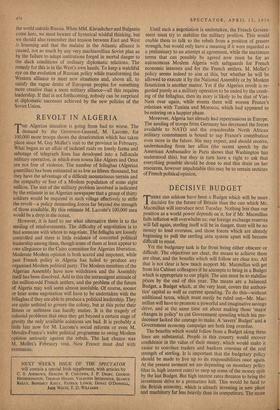DECISIVE BUDGET T HERE can seldom have been a Budget which
will be more decisive for the future of Britain than the one which Mr. Macmillan will introduce next Tuesday. Nothing less than our position as a world power depends on it, for if Mr. Macmillan fails inflation will overwhelm us; our foreign exchange reserves will fall again, sterling itself will be in danger, there will be no money to lend overseas, and those forces which are already beginning to pull the sterling area system apart will become difficult to resist.
Yet the budgetary task is far from being either obscure or difficult. The objectives are clear, the means to achieve them are clear, and the benefits which will follow are clear too. All that is not clear is how much support Mr. Macmillan will get from his Cabinet colleagues if he attempts to bring in a Budget which is appropriate to our plight. The aim must be to stabilise prices by the end of this year. The means are a balanced Budget. a Budget which, at the very least, covers the authori- ties' capital as well as current spending. To do this—without additional taxes, which must surely be ruled out—Mr. Mac- millan will have to promote a powerful and imaginative savings drive, and at the same time set about making those 'major changes in policy' to cut Government spending which his pre- decessor lacked the courage to make. A 'savers' Budget' and a Government economy campaign are both long overdue.
The benefits which would follow from a Budget along these lines are substantial. People in this country would recover confidence in the value of their money, which would make it easier to convince traders and bankers overseas of the real strength of sterling. It is important that the budgetary policy should be made to live up to its responsibilities once again.
At the present moment we are depending on monetary policy (that is, high interest rates) to mop up some of the money spilt by the last Budget. But high interest rates threaten to bring the investment drive to a premature halt. This would be fatal to the British economy, which is already investing in new plant and machinery far less heavily than its competitors. The more the Budget can be made to fulfil its proper role of keeping the economy in balance, the less we shall have to rely on less desirable policies.
In all this Mr. Macmillan will have to rely heavily on his own political grasp of what is needed. On recent form neither the Treasury machine nor the officials who work it are appar- ently capable of giving much help. One inadequate Budget may certainly be the responsibility of a Chancellor, the political chief. But a series of inadequate Budgets which, with perhaps two exceptions, has been what we have had since the end of the war, suggests that there are serious shortcomings in the whole of the budgetary machine. It is to be hoped that next Tuesday will provide reassurance on this point.











































 Previous page
Previous page